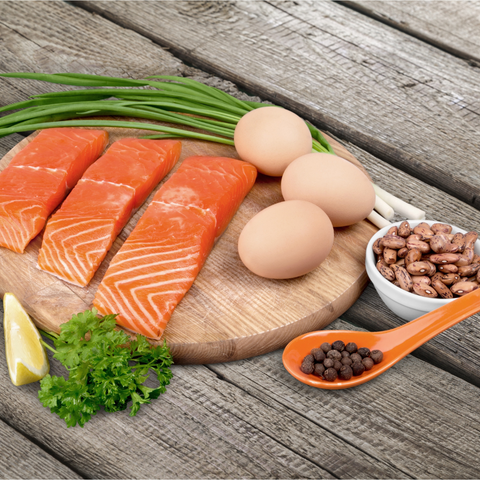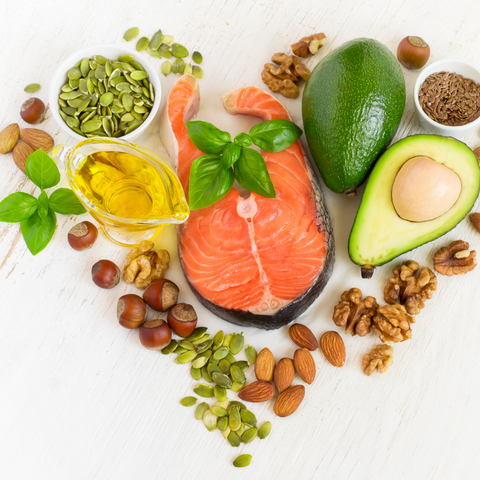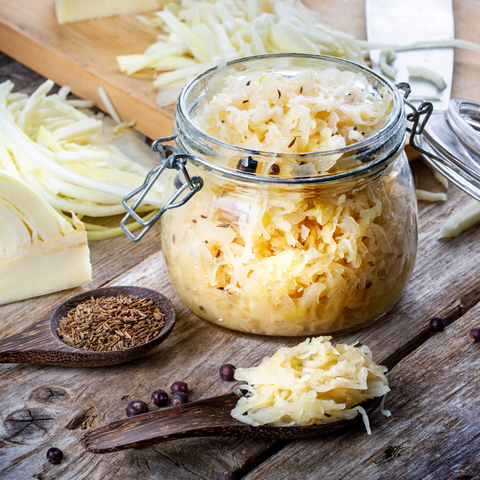Navigating Whole Foods: Blood Sugar-Friendly Options

🎧 On the go? Listen to this episode on The GOOD IDEA Audio Blog, available on Shopify or Apple Podcasts.
For those of us looking to maintain stable blood sugar levels, navigating all of the options at a grocery store can be overwhelming, especially for those managing conditions like diabetes or aiming for optimal well-being. Adding to the complexity of shopping, not all foods marked as “healthy” are blood sugar-friendly. In this blog, we'll explore the aisles of Whole Foods and help to make shopping an easier, healthier, and less stressful task.
Fresh Produce Section:

Whole Foods is renowned for its vibrant selection of fresh produce. Opt for fresh fruits and vegetables, such as:
- Berries (blueberries, strawberries, blackberries, raspberries)
- Leafy greens (kale, spinach, arugula)
- Okra
- Cruciferous vegetables (broccoli, cauliflower)
- Avocados
- Beets
- Citrus fruits (oranges, grapefruit)
These options are rich in fiber, vitamins, and antioxidants, promoting stable blood sugar levels.
Lean Proteins:

Proteins play a crucial role in managing blood sugar levels. Whole Foods offers an extensive range of lean protein sources, including:
- Skinless poultry
- Fish (salmon, tuna)
- Tofu and tempeh
- Legumes (lentils, chickpeas, black beans)
- Eggs
Incorporate these into your meals to provide sustained energy and add to your daily protein intake (a macronutrient that many of us don’t get enough of).
Whole Grains:
Choose whole grains over refined grains to benefit from the added fiber and nutrients. Some blood sugar-friendly whole grains include:
- Quinoa
- Brown rice
- Oats (the blood sugar response to oats is very individualized, so oats may not be a blood sugar-friendly option for everyone)
- Barley
These grains release glucose more slowly into the bloodstream, helping to maintain stable blood sugar levels.
Healthy Fats:

Include sources of healthy fats in your diet for satiety and balanced nutrition. Whole Foods offers various options like:
- Nuts (almonds, walnuts, pistachios)
- Seeds (chia seeds, flaxseeds)
- Olive oil
- Fatty fish (mackerel, sardines)
- Avocados
- Eggs
Healthy fats contribute to a feeling of fullness and can prevent overeating, aiding in blood sugar control.
Dairy and Alternatives:
For those who include dairy in their diet, choose low-fat or non-fat options.
- Greek Yogurt (unsweetened)
- Kefir (a fermented dairy product)
Alternatively, explore plant-based alternatives such as almond milk or soy milk, ensuring they are unsweetened to avoid added sugars.
Snack Aisle:

Whole Foods offers a variety of snacks suitable for blood sugar management:
- Raw nuts (unsalted) and seeds (especially pumpkin seeds)
- Veggie sticks with hummus
- Dark chocolate with a high cocoa content
- Sauerkraut and kimchi
Opt for snacks that combine protein, fiber, and healthy fats to keep you satisfied between meals.
Beverages:
If you are trying a new food or indulging in a treat, grab a GOOD IDEA. GOOD IDEA is a drink backed by over 20 years of scientific research and clinically shown to reduce post-meal blood sugar by an average of 25%. Drink 1/3 of a can before your meal and finish the can with your food. This lightly carbonated sparkling water comes in five flavors, making it a perfect pair to your next Whole Foods adventure.
Take Away Snacks
Navigating Whole Foods for blood sugar-friendly options involves making thoughtful choices across various departments. A good rule of thumb is to start by walking the perimeter of the store. The perimeter incorporates fresh produce and lean proteins. Then head toward the refrigerated section, and then finish your shopping with the remainder of the store. By focusing on fresh produce, lean proteins, whole grains, healthy fats, and mindful snacking, you can create a balanced and delicious diet that supports stable blood sugar levels. Always consult with a healthcare professional or nutritionist to tailor these recommendations to your specific dietary needs and health goals. Happy shopping!
Author: Dr. Colleen Gulick




